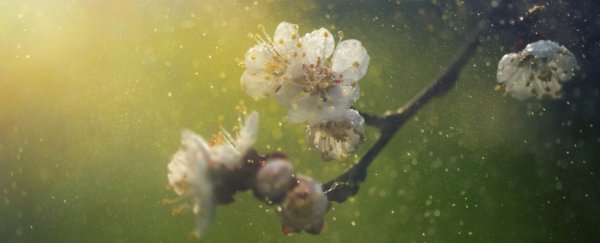There's something in the air we breathe that might make us less inclined towards crime, a new analysis suggests. When pollen is at its highest and hay fever is presumably at its worst, health economists have found a strange decline in urban violence.
Comparing local pollen counts with daily crime reports in 17 US cities, the novel research has revealed that on days with unusually high pollen, violent crime drops by approximately four percent.
While this might sound like a small amount, the authors say such a change in crime is significant, typically requiring a 10 percent boost in city police, or expanding the prison population by 20 percent.
There's precedent for thinking that what we breathe in could somehow affect our behaviour. Previous studies suggest that exposure to pollution tends to increase crime, and it's been proposed that these environmental allergens manipulate the biochemistry of your brain making you more aggressive.
Unlike pollution, however, pollen is not known to have an effect on brain chemistry. While the result is based on a correlation, the authors do suggest a potential cause-effect mechanism: hay fever constitutes a "health shock", making us feel ill and tired, which can raise the physical cost of committing a violent act.
Allergies from pollen affect up to a fifth of the US population, so could these minuscule particles somehow be keeping the peace? There's likely no simple answer, since human behaviour is notoriously complex and there are countless external factors that cannot all be taken into account.
Researchers in this case controlled for weather characteristics, the day, the week, the month, the year, city features, and weekly pollen. The authors also zoomed in on detailed microdata - data at the level of individuals - from New York City to tease out some of the subtler links.
Together, these layered results indicate that high pollen counts lead to an especially large decrease in violent residential crimes, like those between intimate partners or family members.
"In a surprising turn of analysis, we find the bulk of the decline in violent crime in New York to be generated by residential crime (4.4 percent decline)," tweeted one of the researchers, health economist Shooshan Danagoulian at Wayne State University.
"We interpret this as evidence that the effect of the pollen acts as a health shock, in a behavioural effect."
While the link between crime and pollen might sound absurd at first, allergies can actually have a significant effect on one's behaviour and wellbeing. Some research shows that seasonal allergies can impact a person's mood, making them more susceptible to depression and anxiety, potentially even leading to suicide.
There are also transitory short-term effects. Allergic people exposed to pollen have exhibited slower mental function, decreased memory, and poorer reasoning and computation abilities - all of which can change the way you feel and respond to situations.
"Pollen makes people more fatigued, more tired," one of the researchers, economist Monica Deza, told Journalist's Resource.
"The mechanism we are discussing in this paper is that if people are more fatigued and more lethargic, they may be less likely to be angry."
When the researchers examined outdoor activity on these high pollen count days, they found that city bike rentals dropped by eight percent. With more people staying indoors, the fact that these days coincide with decreased domestic crime makes the findings even more significant.
It's the first time, researchers say, that a study has documented a link between health shocks and daily crime levels. And interestingly enough, the relationship only appeared with violent crimes, not property crimes.
"Accordingly," the authors write, "this research suggests that while property crimes sometimes require planning and hence respond to permanent changes in incentives, violent crimes which typically require less planning may respond more to transitory shocks generated by situational factors."
It's an intriguing proposal, but there's still a lot that will need to be explored in more detail.
It remains to be seen, for instance, whether the decrease in violent crime on one pollen-heavy day has any bearing on crime rates in the future, or whether the perpetrator or the victim are most impacted by these allergies, if they even are at all.
The research was published in the Journal of Health Economics.
